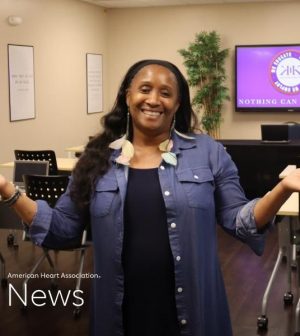- 10 Strategies to Overcome Insomnia
- Could Artificial Sweeteners Be Aging the Brain Faster?
- Techniques for Soothing Your Nervous System
- Does the Water in Your House Smell Funny? Here’s Why
- Can a Daily Dose of Apple Cider Vinegar Actually Aid Weight Loss?
- 6 Health Beverages That Can Actually Spike Your Blood Sugar
- Treatment Options for Social Anxiety Disorder
- Understanding the Connection Between Anxiety and Depression
- How Daily Prunes Can Influence Cholesterol and Inflammation
- When to Take B12 for Better Absorption and Energy
AHA News: Faith-Based Nonprofit Gives Teen Moms a Path to Diplomas and Jobs

MONDAY, Jan. 24, 2022 (American Heart Association News) — At age 16, Barbara Palmer became a single mom. Suddenly, she felt trapped in a community where she had felt so free.
As the middle-class daughter of two police officers, she did not expect to be profiled as poor and criminal.
“At the doctor’s office, they assumed I didn’t have insurance,” she said. Similarly, while at a store, the clerk asked if she’d stolen her bank card. “Until that point, I didn’t understand poverty.”
Her experiences influence the faith-based services of Kingdom Kare Inc., her nonprofit in Odenton, Maryland, which nurtures teenage moms to achieve their educational and career goals. In the next year, Kingdom Kare will support 20 young moms as they get high school diplomas and jobs; in three years, they hope the number will grow to 125.
Through Kingdom Kare, young pregnant women access educational credit, healthy food and job training. Financial literacy and mental health services are offered along with child care. Their partnership with Johns Hopkins University gives 90 Kingdom Kare teen moms monthly wellness checks and postpartum depression screenings, Palmer said.
A high school diploma can be a lifeline for these young families. The Centers for Disease Control and Prevention reports that only about half of teen mothers graduate by age 22, compared to 90% of women who don’t give birth during adolescence. Their children are more likely to have lower school achievement and more health problems, and as teenagers are more likely to be incarcerated, give birth, drop out of high school and become unemployed.
“Our purpose is to provide these teen moms what they need to grow and thrive while reminding them that nothing can stop them,” Palmer said.
“The neighborhoods that Kingdom Kare serves are a mix of all of the things that make health difficult to maintain,” said Pamela Brown, executive director for Anne Arundel County Partnership for Children, Youth, and Families. She lists several social determinants of health – the environments in which people live, work, learn, worship and play that can affect heart, brain and a range of other health outcomes.
“There are low-income military families in private rental properties that may have mold, structural and water issues. There are people making $25,000 a year or less in public housing, with issues relating to lack of access to healthy food such as diabetes and low life expectancy. It’s a perfect storm, really. All the health indicators point to more likely heart issues now or down the road.”
Kingdom Kare is the sole provider of essential social services in this area, Brown said.
Founded by Palmer in 2011, Kingdom Kare is fueled by her savvy. As an accountant-turned-YWCA program director, she reported data on effective services to women and children, then used these positive numbers to attract new funds. Through partnerships, Kingdom Kare opened a Family Support Center in August, where volunteers give away fresh groceries to 1,500 people weekly. The center also holds vaccine clinics and promotes education about vaccinations.
Those innovations for teen moms also received support from the American Heart Association’s EmPOWERED to Serve faith-based business accelerator program, which focuses on community entrepreneurs and nonprofits that are breaking down the social and economic barriers to health equity. Kingdom Kare’s clientele, Palmer said, is about 65% African American, 14% white, 20% Hispanic or Latino and 1% multiracial.
“Barbara has a logical, structural way of thinking, and she overlays a huge passion and belief in creating a healthy community and moving families to self-sufficiency,” Brown said. “She has lived experience that is helpful.”
Palmer, 58, is blunt about her motivation: “These teen mothers are me.”
Becoming pregnant “set me on a winding and difficult road, but I had a kind, generous counselor who reminded me that nothing can stop you, baby, nothing,” she recalled.
Before she could help others, she persevered through an abusive relationship. Then the child born when she was 16 took his life when he was 19. “That still small voice that whispered, ‘This will not break you,’ is that same power that was awakened in me to motivate others, to awaken it in them,” said Palmer, who is an ordained pastor alongside her husband, Antonio, at their church, Kingdom Celebration Center.
For Palmer, her work confirms daily how physical and spiritual health are connected. It’s part of what propels her to reach those who may feel trapped, as she felt as a teen mom.
“To be healthy you have to focus on the total being, and we reach each person where they are,” she said. “If they struggle to get out of bed, we help them get out of bed. When you build trust, you can teach them how to eat better, exercise and get wellness checks. You can’t do anything until you reach them where they are.”
American Heart Association News covers heart and brain health. Not all views expressed in this story reflect the official position of the American Heart Association. Copyright is owned or held by the American Heart Association, Inc., and all rights are reserved. If you have questions or comments about this story, please email editor@heart.org.
By Michelle Hiskey
Copyright © 2026 HealthDay. All rights reserved.










